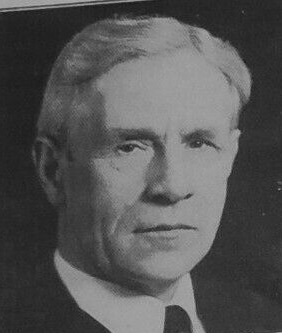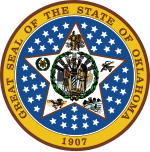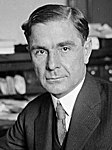
The 1978 United States Senate elections were held on November 7, in the middle of Democratic President Jimmy Carter's term. The 33 seats of Class 2 were contested in regular elections. Special elections were also held to fill vacancies. Thirteen seats changed hands between parties, resulting in a net gain of three seats for the Republicans. Democrats nevertheless retained a 58–41 majority.

The 1972 United States Senate elections were held on November 7, with the 33 seats of Class 2 contested in regular elections. They coincided with the landslide re-election of Republican President Richard Nixon. Despite Nixon's landslide victory, Democrats increased their majority by two seats. The Democrats picked up open seats in Kentucky and South Dakota, and defeated four incumbent senators: Gordon Allott of Colorado, J. Caleb Boggs of Delaware, Jack Miller of Iowa, and Margaret Chase Smith of Maine. The Republicans picked up open seats in New Mexico, North Carolina, and Oklahoma, and defeated one incumbent, William B. Spong Jr. of Virginia.

The 1970 United States Senate elections was an election for the United States Senate. It took place on November 3, with the 33 seats of Class 1 contested in regular elections. Special elections were also held to fill vacancies. These races occurred in the middle of Richard Nixon's first term as president. The Democrats lost a net of three seats, while the Republicans and the Conservative Party of New York picked up one net seat each, and former Democrat Harry F. Byrd Jr. was re-elected as an independent.

The 1964 United States Senate elections were held on November 3. The 33 seats of Class 1 were contested in regular elections. Special elections were also held to fill vacancies. They coincided with the election of President Lyndon B. Johnson by an overwhelming majority, to a full term. His Democratic Party picked up a net two seats from the Republicans. As of 2022, this was the last time either party has had a two-thirds majority in the Senate, which would have hypothetically allowed the Senate Democrats to override a veto, propose constitutional amendments, or convict and expel certain officials without any votes from Senate Republicans. In practice, however, internal divisions effectively prevented the Democrats from doing so. The Senate election coincided with Democratic gains in the House in the same year.

The 1960 United States Senate elections coincided with the election of John F. Kennedy as president on November 8, 1960. The 33 seats of Class 2 were contested in regular elections. A special election was also held on June 28, 1960, for a mid-term vacancy in North Dakota. The Republicans gained two seats at the expense of the Democrats. However, Republican Senator-elect Edwin Keith Thomson of Wyoming died December 9, 1960, and was replaced by appointee Democratic John J. Hickey at the beginning of the Congress, reducing Republican gains to one seat.

The 2010 Oklahoma elections were held on November 2, 2010. The primary election was held on July 27. The runoff primary election was held August 24.

A Massachusetts general election was held on November 7, 1978 in the Commonwealth of Massachusetts.

The 1944 United States Senate election in Oklahoma took place on November 7, 1944. Incumbent Democratic Senator Elmer Thomas ran for re-election to a fourth term. Thomas once again faced a stiff challenge in the Democratic primary, this time from Congressman Wesley E. Disney and Lieutenant Governor James E. Berry. As was the case in 1938, Thomas won renomination only with a narrow plurality. In the general election, he faced former State Senator William J. Otjen, the 1942 Republican nominee for Governor. Though Thomas's performance was much reduced compared to six years prior, he still defeated Otjen by a wide margin.

A general election was in the U.S. state of Oklahoma on November 4, 2014. All of Oklahoma's executive officers were up for election as well as the state's five seats in the United States House of Representatives and both of the states United States Senate seats. Primary elections were held on June 24, 2014, and primary runoffs were held on August 26, 2014.

The 1920 United States Senate election in Oklahoma took place on November 2, 1920. Incumbent Democratic Senator Thomas Gore ran for re-election to a third term. However, he was defeated in the Democratic primary by Congressman Scott Ferris. In the general election, Ferris faced fellow Congressman John W. Harreld, the Republican nominee. Likely helped by Republican presidential nominee Warren G. Harding's victory in Oklahoma over Democratic nominee James M. Cox, Harreld defeated Ferris by a similar margin to Harding's.

The 1942 United States Senate election in Oklahoma took place on November 3, 1942. Incumbent Democratic Senator Joshua B. Lee ran for re-election to a second consecutive term. After winning the Democratic primary against several strong opponents, Lee advanced to the general election, where he was originally set to face former Republican Senator William B. Pine. However, shortly after winning the Republican primary, Pine died; the state Republican Party tapped businessman Edward H. Moore as its replacement nominee. In a favorable Republican environment, Moore defeated Lee by a wide margin to win his first and only term in the U.S. Senate.

The 1938 United States Senate election in Wisconsin was held on November 8, 1938. Incumbent Democratic U.S. Senator F. Ryan Duffy ran for a second term in office. In a three way race, Alexander Wiley defeated Duffy and Lieutenant Governor Herman L. Ekern.

The 1938 United States Senate election in Oklahoma took place on November 8, 1938. Incumbent Democratic Senator Elmer Thomas ran for re-election to a third term. He faced a spirited challenge in the Democratic primary from Congressman Gomer Smith and Governor E. W. Marland, but won the nomination with a slim plurality. In the general election, Thomas faced former State Senator Harry O. Glasser, the Republican nominee. Despite the nationwide trend favoring Republicans, Thomas overwhelmingly won re-election.

The 1924 United States Senate election in Oklahoma took place on November 4, 1924. Incumbent Democratic Senator Robert Latham Owen declined to run for re-election. In a crowded Democratic primary, impeached former Governor Jack C. Walton won the party's nomination with a narrow plurality. In the general election, he faced businessman William B. Pine, the Republican nominee. Though Democratic presidential nominee John W. Davis narrowly won the state over President Calvin Coolidge, Walton's unpopularity and controversy caused Democrats to lose the seat; Pine defeated Walton in a landslide.

The 1926 United States Senate election in Oklahoma took place on November 2, 1926. Incumbent Republican Senator John W. Harreld ran for re-election to a second term. After facing many challengers in a crowded Republican primary, he advanced to the general election. In the Democratic primary, Congressman Elmer Thomas beat out a similarly crowded field, which included former Governor Jack C. Walton, to win his party's nomination with a plurality. In the general election, Thomas defeated Herrald in a landslide, winning his first of four terms in the U.S. Senate.

The 1936 United States Senate election in Oklahoma took place on November 3, 1936. Incumbent Democratic Senator Thomas Gore ran for re-election to his second consecutive term, and fifth term overall. He ended up easily losing renomination, however; he placed a distant fourth in the Democratic primary. A runoff election between Congressman Joshua B. Lee and Governor Ernest W. Marland resulted in a landslide win for Lee. In the general election, Lee faced Republican nominee Herbert K. Hyde, whom he overwhelmingly defeated.

The 1962 United States Senate election in Oklahoma took place on November 6, 1962. Incumbent Democratic Senator Mike Monroney was re-elected to a third term. After winning a sizable victory in the Democratic primary, Monroney faced Republican former U.S. Attorney B. Hayden Crawford in the general election. Monroney won his last term in the Senate before his defeat in 1968. This election marks the last time a Democrat won the class 3 senate seat from Oklahoma.

Elections were held in Illinois on Tuesday, November 3, 1936.

The 2022 Oklahoma Senate general election were held on November 8, 2022. The primary elections for the Republican, Democratic, and Libertarian parties' nominations took place on June 28, 2022. Runoff primary elections, if no candidate received 50% in the June 28 vote, took place on August 23. All candidates had to file between the days of April 13–15, 2022. Oklahoma voters elected state senators in 24 of the state's 48 Senate districts. State senators served four-year terms in the Oklahoma Senate.

A general election was held in the state of Oklahoma on Tuesday, November 8, 2022. The primary election was held on Tuesday, June 28, 2022. Runoff primary elections, where necessary, were held on Tuesday, August 23. The candidate filing period was April 13, 2022 to April 15, 2022.













